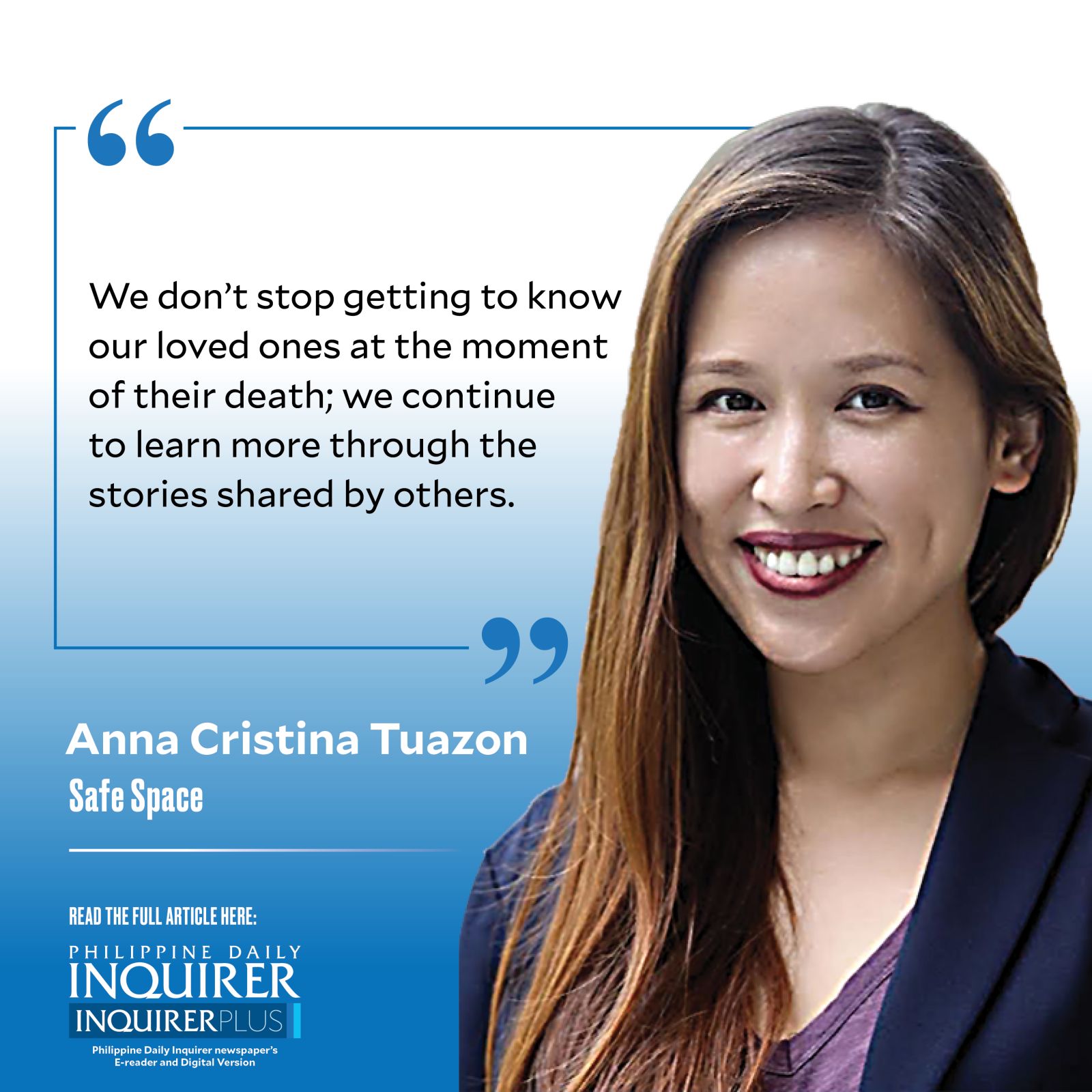Grief and remembrance

My lolo passed away in December of last year. This will be the first time we commemorate him on All Souls’ Day.
What does a year after grief look like?
There is no standardized timeline for grief and mourning. And there is certainly no one way to grieve. It does, however, generally get better, in the sense that relentless grief gets replaced by occasional waves of sadness and yearning. You are never quite the same and yet you begin to find yourself again and start focusing on life that is still to be lived. At best, you’ve created meaning out of grief and have directed that energy toward finding ways to remember and honor your departed loved ones.
Article continues after this advertisementRecovering from grief does not necessarily mean achieving a grief-less state but instead finding ways to live with it. Some people think that to get over grief is to forget while in some ways the more healing path is to remember. I have always found it interesting that we put more focus on Nov. 1, All Saints’ Day, instead of Nov. 2 when most Filipinos observe these holidays by going to cemeteries and praying for their departed family members rather than focusing on saints. This is a holiday that allows us to remember our ancestors and share the stories behind the tombstones.
This is also a prime opportunity to remember where we came from and on whose shoulders we stand. It is a time to experience gratitude for the path they paved before us. Perhaps the first person in the family who was able to graduate from college led to the next generation having access to a better life. The first relative who sought their fortunes abroad allowed the clan to buy their first home in their homeland. Maybe the headstrong relative who bucked tradition and withstood ridicule and shame allowed their descendants the courage to take on divergent paths. We can also learn a lot from ancestors who, even if they weren’t necessarily a source of familial pride, became a source of cautionary wisdom that allowed the others to repair their wrongs and grow as better people.
Remembering also involves incorporating new perspectives. How many of us have discovered, through adult eyes, that how we remembered an incident as a child was very different from how things actually played out? By listening to others’ versions of the same event, we enrich the story and build it toward something that resembles the more accurate truth.
Article continues after this advertisementThis is why exchanging stories is important. Sometimes listening to others’ recounting of their experiences with our departed can yield more learning and insights than treating remembrance as a solitary activity.
How many times have we learned something new about our family member through the people we meet at their funeral? I knew my lolo only as that, a lolo. I have discovered many things about him as an uncle and friend through those who visited him during the wake. We don’t stop getting to know our loved ones at the moment of their death; we continue to learn more through the stories shared by others. This is why sometimes people feel closer to their ancestors even if perhaps they haven’t met them or haven’t been close to them while they were still living. In this way, relationships do not necessarily end in death but can continue on — as long as one remembers.
I became pregnant just a few months after my lolo’s passing. Upon learning this, my great-aunt — his only remaining sister — clasped my hands and said that my lolo gets to be reborn through my son. He will be named after his great-grandfather, partly as a remembrance and partly to ensure that my son will feel connected to something larger than himself. I want my son to find comfort and inspiration from the men who stood before him so that he will develop the strength for the challenges that will undoubtedly lie ahead. I will make sure to tell him stories of the people he was named after so he will feel rooted and anchored so he is not so easily swayed by external pressures. He will learn that there is much to learn from the past and that, by doing so, he will gain the freedom to shape his future.
I hope I can do all this without making the past a source of burden or pressure but treat the past like a tree he can lean on whenever the world overwhelms him. All Souls’ Day can be so much more than simply visiting the cemetery. It is a time to nurture and grow our relationship with our departed. It can be a time-honored tradition where we reconnect with our legacy and develop a shared meaning of what it means to be family. Especially for those who feel disconnected and alone, grief and remembrance can remind us that we were capable of meaningful connections in the past — and that we are still capable of connection in our present.
















